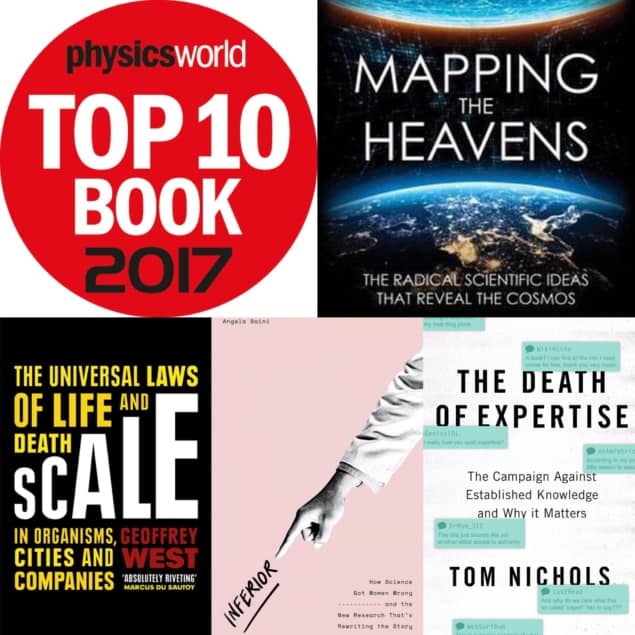
By Tushna Commissariat
The first week of December can only mean one thing – it’s time to reveal the shortlist for the Physics World book of the year. We’ve based our choice on the 54 books we’ve reviewed over the last 12 months in Physics World, picking our favourite 10 using the same three criteria that have been in place since we launched our book of the year award in 2009. These are that the books must be well written, novel and scientifically interesting to physicists.
Following on from a tumultuous 2016, this year has seen much political strife and human-rights crises, along with the rise of the unexpected demon of “fake news”. Unsurprisingly, the books we reviewed in Physics World this year reflected a lot of these global issues, which means that, along with the usual mix of popular-physics titles, the 2017 shortlist has a few books that at first sight might not seem to have direct links to physics. However, we feel these titles are nevertheless important and relevant to physicists (and of course scientists in general).
Given the number of strong and interesting books on our shortlist, it’s going to be hard to pick a single winner. That, however, is what we shall endeavour to do, via the Physics World podcast next week, when we’ll announce the award-winning book and discuss some of our other favourites on the shortlist. Let us know which ones you have read and are your favourite, and which you may be adding to your Christmas list.

The shortlist for Physics World’s 2017 Book of the Year:
Marconi: the Man Who Networked the World by Marc Raboy
Italian entrepreneur, innovator and future Nobel physics laureate Guglielmo Marconi’s had an ambitious vision for an interconnected, global wireless network in 1897, modelled on the existing global telegraphic network that spanned the globe in the late 19th century. Marconi’s complicated disposition, which shaped his work as well as his personal life, and the lives of many others, thanks to his embryonic “wireless telegraphy”, is described in this “major and long overdue biography” by Marc Raboy.
Mapping the Heavens: the Radical Scientific Ideas That Reveal the Cosmos by Priyamvada Natarajan
Author and Yale University professor Priyamvada Natarajan travels across space and time in her book, as she aims to introduce readers to some of the “greatest hits” of cosmological discoveries that have changed the way we look at our universe. Mapping the Heavens tackles the science behind concepts such as the accelerating expansion of the universe and dark matter, but also describes how such “radical” scientific theories gain acceptance. Natarajan also describes how the line between scientific idealism and scientific realism is blurry, as all scientific endeavours – especially cosmology – are affected by human bias.
Hidden Figures: the Untold Story of the African American Women Who Helped Win the Space Race by Margot Lee Shetterly
Once written out of history, Hidden Figures tells the inspiring tale of the African-American female mathematicians who helped the US win the space race, who came to work at NASA at Langley Field campus in Hampton, Virginia, following the labour shortages of the Second World War. The book provides a detailed account of the remarkable impact these intelligent and brave women had on some of NASA’s greatest hits, despite the social norms of the time. Since its publication, the book has been made into a film by the same name, which was also very well received.
The Glass Universe: How the Ladies of the Harvard Observatory Took the Measure of the Stars by Dava Sobel
Similar to Hidden Figures in many ways, but going further back in time to the early 1900s, The Glass Universe reveals the revolutionary work done by the female astronomers at Harvard Observatory, at a time when modern astrophysics was really taking off, thanks to the advent of photographic techniques and devices such as large refractor telescopes. Some 80 women were hired as “human calculators” by Observatory director Edward Charles, to process the ever-growing amounts of astronomical data. This talented team – which included now-famous astronomers such as Annie Jump Cannon and Henrietta Swan Leavitt – went on to make huge contributions to astronomy as we know it today, and author Dava Sobel tells their untold tale in her latest book.
Scale: the Universal Laws of Life and Death in Organisms, Cities and Companies by Geoffrey West
There exist some very real constraints on how large a complex organism can grow. This is the essence of all modern-day scaling laws, and the subject of author Geoffrey West’s provocative new book, Scale. A physicist by training, West is a pioneer in the field of complexity science, and this book is the culmination of years of interdisciplinary research geared toward answering one fundamental question: could there be just a few simple rules that all complex organisms obey, whether they are animals, corporations or cities? West seems to think so, and Scale makes a rigorous and convincing argument for his case.
Not A Scientist: How Politicians Mistake, Misrepresent and Utterly Mangle Science by Dave Levitan
This year, the Collins Dictionary’s Word of the Year 2017 is “fake news.” The dictionary describes this as “false, often sensational, information disseminated under the guise of news reporting”. While this term has been lobbed by US President Donald Trump at a multitude of media organizations over the year, politicians world over have a long and troubling history of subverting science to suit their own political agendas – this is what Dave Levitan’s Not A Scientist explores. In the age of “alternative facts” this is a vital if worrying reading.
Inferior: How Science Got Women Wrong and the New Research That’s Rewriting the Story by Angela Saini
Inferior is a bold book, which takes a hard look at the bad science that has been used to diminish women. Author Angel Saini provides an extremely well-researched and impartial analysis of the science behind the gender stereotypes that hold women back. An accessible entry to the world of gender studies, neuroscience and evolutionary psychology and primatology, Saini travels the world to establish whether it is biology or bias that causes the social imbalance of women. Despite its troubling findings, the book remains upbeat as Saini finds campaigners throughout history who stand up for equality. Inferior serves not only to shed some light on bad science but to provide young women with the scientifically-accurate ammunition to change the world.
We Have No Idea by Jorge Cham and Daniel Whiteson
Frequently hilarious, deeply charming and full of excellent comics, We Have No Idea is an exploration into the unknown. Written and illustrated by by Jorge Cham – the artist behind the popular PHD Comics – and CERN particle physicist Daniel Whiteson of the University of California, Irvine, US, the book does a commendable job of explaining deep ideas with wit and humour. The authors include a number of clever analogies and very clear explanations of the basics of relativity and particle physics, while pondering about things such as the maximum speed of the universe.
The Secret Science of Superheroes edited by Ed. Mark Lorch and Andy Miah
The Secret Science of Superheroes is a collection of 15 eclectic essays written by a team of like-minded scientists who met at the 2016 Manchester Science Festival, where they came together to try to suss out the real-world science behind everything from Wonder Woman’s lasso to the Hulk’s gigantic transformation. The book makes excellent use of science fiction as a vehicle for science fact, covers a wide scientific territory and provides references for further reading. The book makes fictional superheroes seem more plausible, as do advances in technology to augment or enhance us humans.
The Death of Expertise: the Campaign Against Established Knowledge and Why it Matters by Tom Nichols
“Buy this book. And read it. Regularly.” That’s the powerful summary of the book by our reviewer Philip Moriarty. The Death of Expertise is an exceptionally timely, carefully reasoned and impassioned analysis of just why, in today’s times, people seem proud of not knowing things. At a time when trust in science, scientists and experts in constantly being questioned – with prominent politicians such as British environment secretary of state Michael Gove going as far as saying “people in this country have had enough of experts” – Nichols’ book has some suggestions on to fix this ongoing cult of ignorance.
Special mention:
Everything You Know About Science is Wrong by Matt Brown
While this book did not make our shortlist, Everything You know About Science is Wrong is a witty and whimsical book where author Matt Brown busts common science myths that masquerade as facts. Brown tackles science (and scientists) in pop culture, astronomy, physics, chemistry, biology, geology, the human body and famous scientists in a entertaining manner, and this little book is full of excellent laughs and accurate science.



